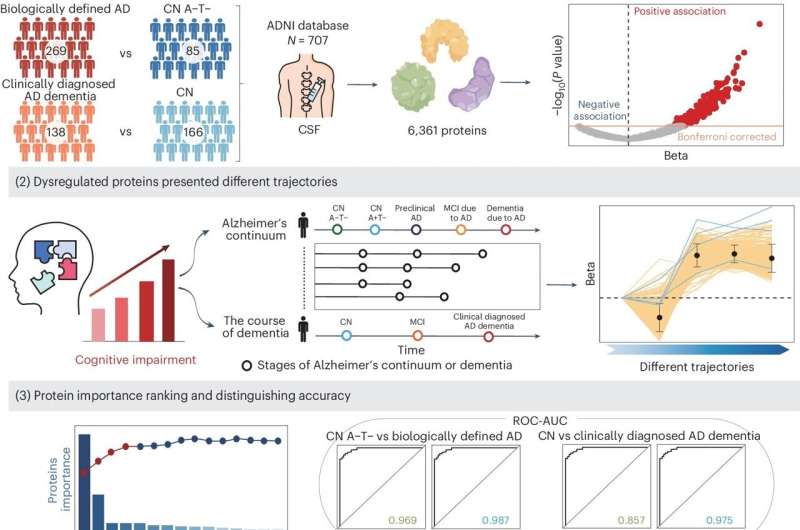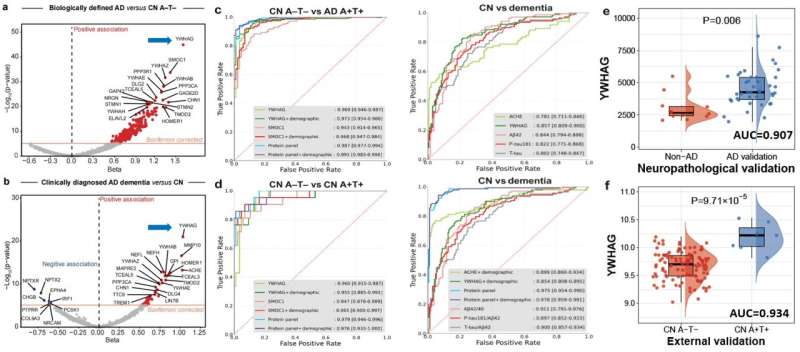July 22, 2024 feature
This article has been reviewed according to Science X's editorial process and policies. Editors have highlighted the following attributes while ensuring the content's credibility:
fact-checked
peer-reviewed publication
trusted source
proofread
Study identifies new biomarkers of Alzheimer's disease

Recent advances in the study of proteomes (i.e., the entire range of proteins expressed by human cells and tissues) have opened new opportunities for identifying the biological markers of specific diseases or mental disorders. This could in turn inform the prevention, diagnosis and treatment of these medical conditions.
Researchers at Fudan University recently set out to examine proteins in the cerebrospinal fluid (CSF) of individuals with and without Alzheimer's disease (AD). The results of their analyses and experiments, outlined in a paper published in Nature Human Behavior, unveiled specific CSF proteins that could serve as biomarkers of the disease.
"Our recent paper emerged from the urgent need to enhance early diagnosis and prediction of AD," Jintai Yu and Yu Guo, co-authors of the paper, told Medical Xpress. "This study was inspired by the growing understanding that Alzheimer's has complex and multifaceted pathophysiology that current diagnostic methods fail to capture comprehensively."
The primary objective of the recent study by Yu, Guo and their colleagues was to identify specific biomarkers in the human CSF that could help to accurately detect AD and predict its progression. To achieve this, the researchers analyzed CSF samples extracted from patients diagnosed with AD, who were at different stages of the disease, as well as samples from cognitively normal individuals.
"We utilized multiplex proteomics, a sophisticated method that allows for the simultaneous measurement of multiple proteins within a sample," Yu and Guo said. "This technique involved mass spectrometry, which is highly sensitive and capable of detecting even minute changes in protein levels."
The analyses carried out by Yu, Guo and their colleagues uncovered proteins that are linked to the core pathology of AD, while also identifying proteins that could indicate inflammation, neuronal damage and other disruptions in human physiological processes. By comparing the proteomic profiles of patients diagnosed with AD with those of control individuals, they uncovered new biomarkers that could help to diagnose and estimate the progression of AD.
"The most notable finding of this study is the identification of the novel biomarker CSF YWHAG," Yu and Guo said. "Among 6,361 proteins, CSF YWHAG performed best in diagnosing both biologically (AUC=0.969) and clinically (AUC=0.857) defined AD. Four (YWHAG, SMOC1, PIGR, and TMOD2) and five (ACHE, YWHAG, PCSK1, MMP10, and IRF1) protein panels greatly improved the accuracy to 0.987 and 0.975, respectively."

To assess the effectiveness of the biomarkers they identified, the researchers carried out a further follow-up study on an independent and external cohort of patients. The results of this study validated the strength of the biomarkers.
In addition, using the autopsy data, the authors showed that the biomarkers they identified could help to distinguish between samples extracted from deceased individuals with AD and those extracted from others who never received an AD diagnosis, outperforming existing biomarkers used to diagnose the disease.
"The uncovered biomarkers also effectively predicted the clinical progression to AD dementia and were strongly associated with AD core biomarkers and cognitive decline," Yu and Guo said. "Better understanding the different molecular subtypes of Alzheimer's may lead to refined treatment approaches, targeting specific pathological processes in individual patients."
Using sophisticated techniques for the analysis of proteomes, the researchers were able to reveal molecular changes associated with AD, which were found to be a highly promising diagnostic target. In the future, this study could inform the development of high-precision tools for accurately diagnosing AD, as well as targeted early therapeutic interventions.
In their next studies, Yu, Guo and their colleagues plan to replicate their study on external cohorts extracted by a wider range of diverse individuals. In addition, they hope to refine the biomarkers they identified and develop standardized diagnostic tests for these markers that could be performed in clinical settings.
"In our future research, we will also explore the biological mechanisms underlying the identified proteomic changes to understand better how these biomarkers relate to disease progression," Yu and Guo added.
"Longitudinal studies will also be conducted to determine how early these biomarkers can predict Alzheimer's and how they correlate with clinical outcomes. The ultimate goal is to integrate these biomarkers into routine clinical practice, facilitating early diagnosis and personalized treatment strategies."
More information: Yu Guo et al, Multiplex cerebrospinal fluid proteomics identifies biomarkers for diagnosis and prediction of Alzheimer's disease, Nature Human Behaviour (2024). DOI: 10.1038/s41562-024-01924-6
© 2024 Science X Network




















